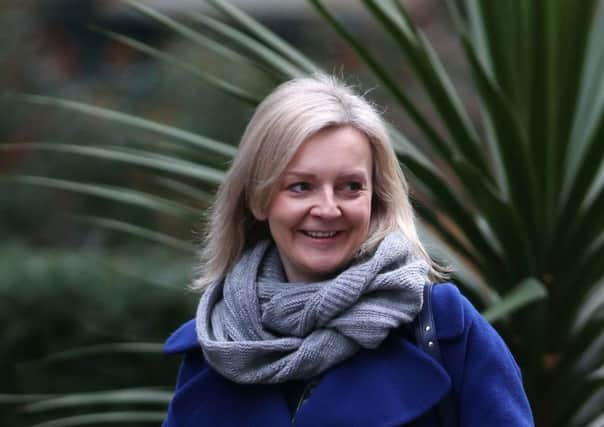Brexit '˜would mean start of years of uncertainty'


The minister warned that leaving the EU would be a leap in the dark for British agriculture, and could put the country’s European food and farming export market – worth £11 billion each year – at risk.
Speaking at the English NFU annual conference in Birmingham yesterday, Truss admitted there were significant issues with current European farm regulations, particularly in terms of the three crop rule and cross compliance.
Advertisement
Hide AdAdvertisement
Hide AdBut, at odds with her Defra colleague farm minister George Eustice who announced his plans to campaign to leave the EU earlier in the week, she insisted that being part of a reformed EU was the best deal for British farmers.
“At a time of severe price volatility and global market uncertainty I believe it would be wrong to take a leap into the dark,” she told delegates.
“The years of complication and risk caused by negotiating withdrawal would be a distraction from our efforts to build a world-leading food and farming industry.”
Truss said that if the British public voted in favour of a Brexit, the process of leaving the EU would take a minimum of two years, but in all likelihood would take considerably longer.
In that time the industry risked being distracted from the key issues it needed to focus on to help the industry ride out the current difficulties it faced.
“If we spend the next two to five years renegotiating agreements it’s distracting from the huge opportunity to build a strong industry.”
Truss admitted that the current CAP was the most complicated ever, and she wanted to see more decisions made at national and local levels in areas like pesticides and environmental stewardship rules.
However, remaining part of a reformed EU would give Britain the chance to work to reduce bureaucracy and secure further reform while still enjoying the benefits the single market brought.
Advertisement
Hide AdAdvertisement
Hide Ad“At the moment we are part of the single market with access to 500 million consumers, and we are part of making the rules. If we were to negotiate a deal we don’t know what that outcome would look like.
“If we were to leave we would most probably have to follow the rules around trade regardless,” she added. “If we wanted full access to the market we would likely have to accept free movement and still pay into the EU.
Having previously admitted that Defra had no Plan B for agriculture should the country vote to leave the EU, Truss said the government was set to publish a document outlining alternatives for the country in the coming weeks.
“But the real answer is we don’t know exactly what it will look like - voting to leave really is a step into the unknown.”
North of the Border, the Scottish Government has made clear its support for continued EU membership – and rural affairs cabinet secretary Richard Lochhead recently made his own stance unequivocal, stating that remaining within the EU was “absolutely crucial” for the future of Scottish farming.
He said that the Common Agricultural Policy was expected to inject more than €4.5bn into the Scottish economy over the current CAP period, adding that Europe was also the number one destination for international food and drink exports.
“Continued EU membership is therefore absolutely crucial for the future of Scottish farming,” said the cabinet secretary.
“Scotland needs a fairer share of funding from a simpler and more streamlined CAP with food production at its core.”
Advertisement
Hide AdAdvertisement
Hide AdMeanwhile, with the referendum taking place on Thursday 23 June, the organisers of the Royal Highland Show were swift to recognise the date clash for the estimated 50,000 visitors and exhibitors expected to attend the opening day of the show.
“The Royal Highland Show is the most important four days in the country’s calendar and even an EU referendum won’t keep show-goers away,” said RHASS chairman Willie Gill.